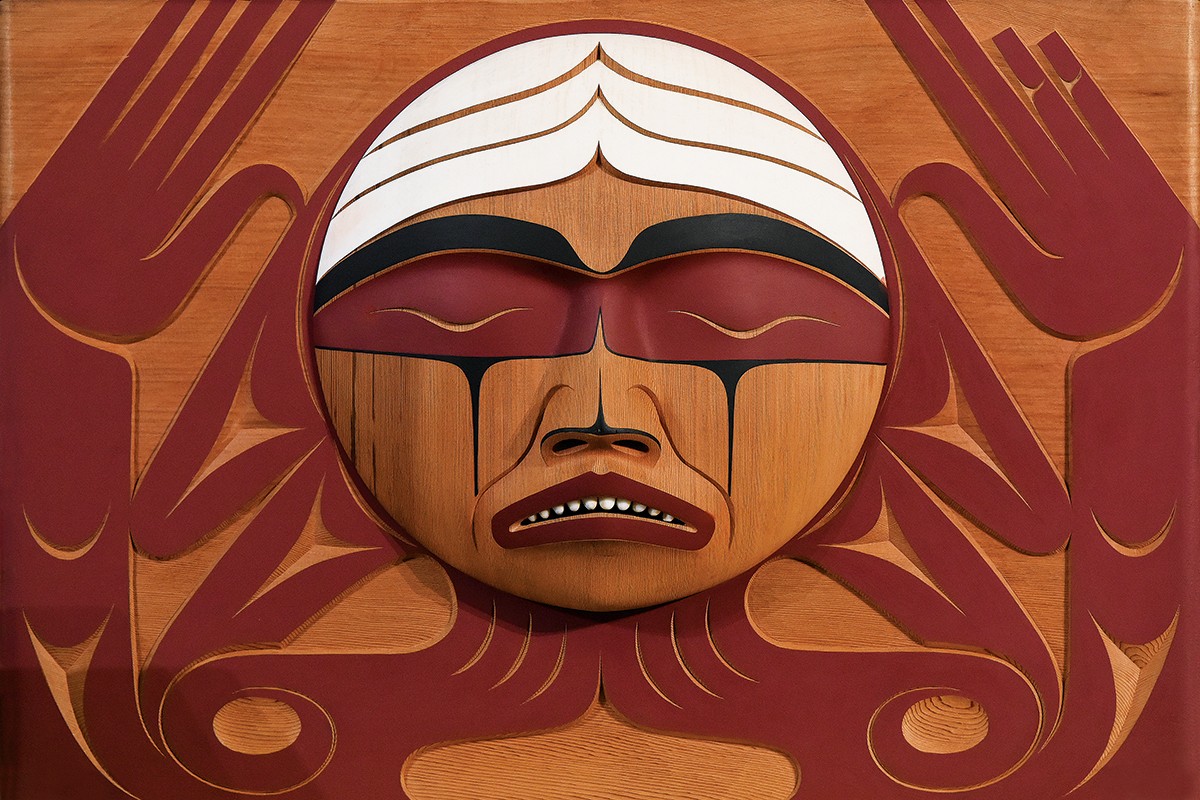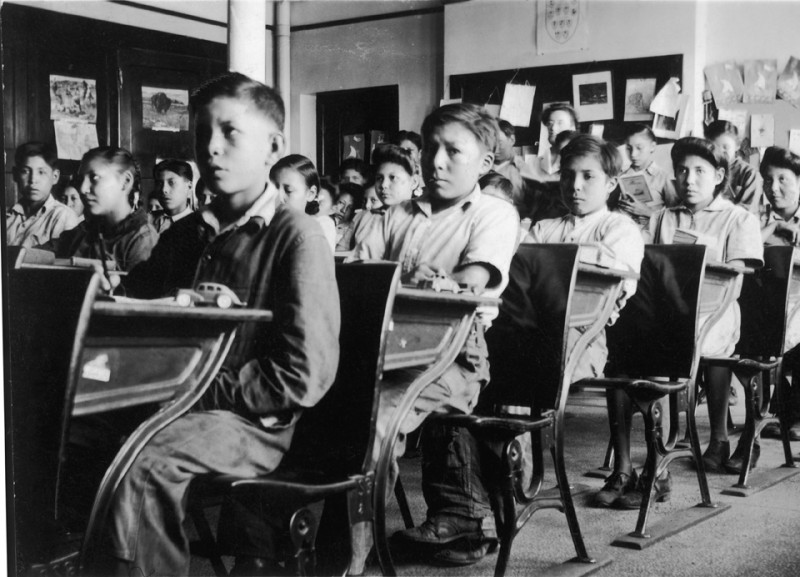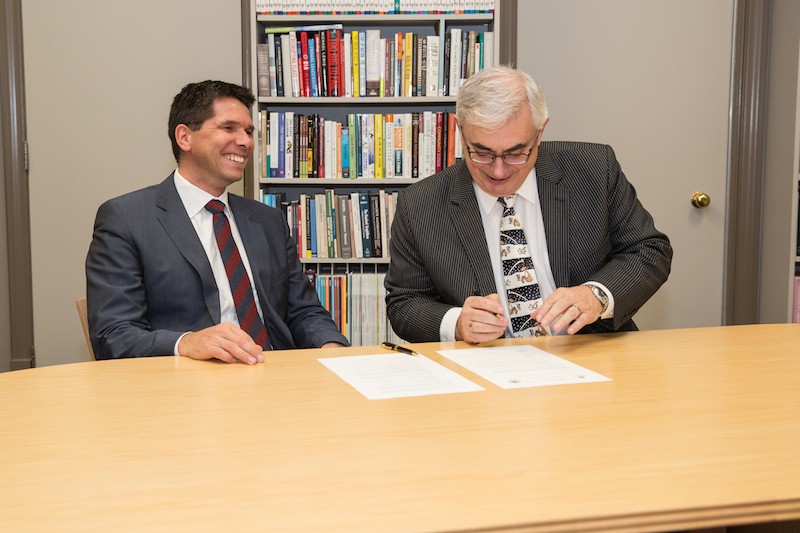
THE BENTWOOD BOX: CARVED BY COAST SALISH ARTIST LUKE MARSTON, THE TRC BENTWOOD BOX IS A LASTING TRIBUTE TO ALL INDIAN RESIDENTIAL SCHOOL SURVIVORS. THE BOX TRAVELLED WITH THE TRC TO ALL OF ITS OFFICIAL EVENTS.
Truth and Reconciliation Commission of Canada issues final report
Frederick Ernest Koe just awoke when an Anglican minister and the police knocked on his family’s door in the Northwest Territories. They told him he had to come with them.
“And I didn’t get to say goodbye to my dad or my brother Allan, didn’t get to pet my dogs or nothing.”
For the past six years the Truth and Reconciliation Commission of Canada has traveled to every part of Canada, documenting 7,000 stories such as Koe’s. Each story is unique, each illuminates the harms of the past, and each is now persevered at National Centre for Truth and Reconciliation at the University of Manitoba.
The Commission’s difficult and crucial task officially began on June 2, 2008, and on Dec. 15, 2015, they issued their final report. The legacy of their work will forever endure at the NCTR, which will act as Canada’s Indigenous Archives, promoting and advancing reconciliation.
Reconciliation, the Commission says, “is about establishing and maintaining a mutually respectful relationship between Aboriginal and non-Aboriginal peoples in this country.”
It is not about shaming, says Deborah Young, executive lead of Indigenous Achievement at the U of M.
“It’s not about pointing the finger. It’s not about blaming,” she said in an interview with UM Today The Magazine. “It’s about having a dialogue. That’s how I think reconciliation happens. We sometimes make things very complicated for ourselves and it doesn’t need to be. And it doesn’t have to be a hard conversation either.”
Universities like the U of M will be at the front and centre of this dialogue because education is a primary force for change. And the NCTR, with its partners across the country, will play a pivotal role.
“Our purpose is not only about documenting the past,” Ry Moran, NCTR’s director, said at the centre’s opening. “We’re honouring the wishes of Survivors by educating the public on this chapter in Canadian history. By encouraging all Canadians to embrace this history, we hope to create a common ground to build a stronger foundation for Indigenous communities in Canada.”
The U of M invites all other Canadian post-secondary institutes to work with us and our partners and supporters at NCTR because reconciliation cannot be accomplished in isolation.
Writing in the Ottawa Citizen, David Barnard, President and Vice-Chancellor at the University of Manitoba, argued that universities must integrate Indigenous knowledge and perspectives into courses, programs and services. Universities influence policy-makers and community dialogues, thus they must decolonize their systems so that they do not perpetuate harms or hinder progress.
“When understanding of First Nation, Métis and other Indigenous cultures is woven through all of our campuses, then real change will occur not only within the institution, but within the many areas of society that we reach,” he wrote.
The University of Manitoba took a large step in this direction on Dec. 10, 2015, when it signed a Memorandum of Understanding with the Treaty Relations Commission of Manitoba focused on Treaty education. The MOU will enhance learning experiences for students, staff, and faculty relative to Treaty and Treaty-related matters, and will guide the University community in advancing reconciliation and implementing the Truth and Reconciliation Commission’s calls to action.
The latest issue of UM Today The Magazine explored the concept of a nation trying reconcile with itself – how does it look, what does it do?
Five Indigenous community leaders shared their views, including Justice Murray Sinclair. On the role of universities, he said:
Universities are bastions of academic and intellectual growth. And so we need to ask those thinkers and those philosophers, those people who study, those people who research, to widen their horizons, so that they’re doing research and increasing the knowledge base of Canadian society about Aboriginal issues. And doing it in a way that is not culturally biased and that is not culturally inappropriate and where culture is not appropriated. So Aboriginal people can still have an intact culture after the exercise is all over, and most Canadians will have a better understanding of what it means when the Aboriginal community talks about things from their perspective.
Although the TRC may be officially done its mandate, Canada must continue to work. Reconciliation, the Commission says, calls for community action.
As the Commission writes: “All Canadians must make a firm and lasting commitment to reconciliation to ensure that Canada is a country where our children and grandchildren can thrive.”
The University of Manitoba is invested in this vision.
Indigenous Achievement is an institutional priority of the University of Manitoba. One of the five pillars of the University of Manitoba’s $500-million Front and Centre comprehensive fundraising campaign is to ensure Manitoba becomes a centre of excellence for Indigenous achievement.
The U of M currently holds more than 40 Canada Research Chairs, three of which focus on matters of importance to Indigenous culture and well-being. Front and Centre will create a new $5-million research chair in Aboriginal Law. This will help ensure Indigenous perspectives, traditions and priorities are integrated into the foundations of our Faculty of Law.
And on May 13, the University of Manitoba announced a $1 million gift from TD Bank Group, which will provide financial support, training and experience for student interns at the National Centre for Truth and Reconciliation (NCTR). The gift will benefit up to 76 interns, over a 10-year period, who will work to process and digitize materials acquired during the Truth and Reconciliation Commission.
Research at the University of Manitoba is partially supported by funding from the Government of Canada Research Support Fund.









This is of course a very emotional topic. We hope, however; that recommendations will be adopted based on sound reasoning, not emotional reaction. For example, We wrote the Honourable Justice Murray Sinclair, commissioner, to point out: One of the recommendations in your excellent report states: (Education, 6.), “We call upon the Government of Canada to repeal Section 43 of the Criminal Code of Canada.”
It’s very clear that residential school children suffered horrendous abuses of all kinds. However, absolutely nothing that went on there has anything to do with our current limited sec.43 constructive discipline laws. In fact, it is this law (and the Supreme Court Rulings on it January 2004) that expressly criminalizes these former experiences. So we found it quite disturbing that someone would use this atrocity against our First Nations as a lever on this entirely unrelated issue. Thank You, K43
well im happy to hear the truth being told and how it is being told and expressed wholeheartedly, but some of us still dealing with a lawyer why is he still in court and the court throw out 16 allegations out of 21 new allegations, how come this is not acknowledged,